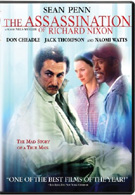Sam Bicke wanted everyone to remember how he changed the world by proving that one small grain of sand can rise up against the machinations of the world. Instead he is but a footnote in history, relegated to trivia questions nobody knows the answer to and this film, The Assassination of Richard Nixon. If you don’t know who Samuel Bicke is, don’t feel bad. Bicke conspired to assassinate Richard Nixon but failed, panicking in the 11th hour and tossing aside his surprisingly well thought out plans, eventually committing suicide. But as I said, don’t feel bad if you don’t know about it. A Google search on Bicke’s name reveals only reviews for this movie, and the suggestion that perhaps you meant to type in “Samuel Beckett”. It does not, however, offer hints to any historical facts about the man or the event.
In The Assassination of Richard Nixon Sean Penn is Samuel Bicke. Bicke is instantly recognizable as the kid everyone picked on in the playground. You know the one, the kid even the lowest nerd was able to get a few kicks in on. They just didn’t fit in with normal society, whether it was because they couldn’t grasp the commonplace concepts of how society works, or they just didn’t want to. Under Penn’s masterful skill as an actor, Bicke is instantly recognizable as the type of person you’d want to get away from, if by some chance he broke through his cocoon and started talking to you. He’d never recognize that from your body language though, he’s just that unaware.
For Bicke his problem is more than just the world around him. He’s separated from his wife Marie (Naomi Watts) and having problems acclimating to the world of sales. His boss runs a family business, preaching that you have to believe in what you sell. But if Sam couldn’t get used to his brother’s sales tactics, he certainly won’t be able to adapt to his boss’s, who shows Sam that the greatest salesperson of all time is president Richard Nixon, who sold himself in two separate elections on the exact same promise, despite not filling that promise after the first election. Instead Sam dreams of owning his own business with his black friend Bonny (Don Cheadle), not that I usually would point out when a character was black, but in this case it’s important. In Sam’s world of 1974, where loans take eight to ten weeks for approval and rotary phones were all the rage, the fact that Sam’s would-be business partner is black is Sam’s excuse for failure - everyone is a racist in Sam’s eyes, from Bonny’s clients at his garage, to the loan officers who reject Sam’s loan application. Sam’s life goes from awkward to just plain bad as his wife finalizes their divorce and he looses his job, so who does he turn his frustration at the corporate mentality toward? Richard Nixon, the best salesperson of them all. Surely if the world of sales has failed Sam, then the king of sales must be the one to blame.
The Assassination of Richard Nixon is a character study in every sense of the phrase. As we are introduced to Penn’s character he is about to embark on his mission to kill the president. From there the bulk of the movie is a flashback to explain Sam’s actions. So how do you create a character that is sympathetic, even though the first moments of the film show the horrendous task he has set for himself? Easy, you take a finely crafted script, put it in the hands of an extremely talented actor, and film the results. Penn is completely at his best here, disappearing completely within a character that, within minutes of being introduced to, you can’t help but feel sorry for. You know if you ran into him in a bar you would be extremely uncomfortable around him, because he doesn’t fit in this world, but you still can’t help but feel for his plight. As he faces having to lie, cheat, steal, and shave his mustache, his narration provides insight to the character’s soul in the form of recordings Sam sent to Leonard Bernstein to explain why he was about to do what he was doing. Whey Bernstein? Because his music was pure and true, and only he would be able to communicate to the world the truth of what Sam was accomplishing (see what I mean about not quite fitting in?).
Naomi Watts is also phenomenal in what is a pretty minor role. I’ve continued to be impressed with Watts as an actress, and it’s fantastic to see she continues to have no interest in being just a pretty face. Like many of her other roles, Sam’s estranged wife is a pretty unglamorous part (let’s face it, so were the 1970s for the most part). The strength she gives her character during her small amount of screen time completely parallels Sam’s character, showing just how weak he is. The same can be said of Don Cheadle, whose character seems more comfortable with the way business works, and is less likely to toss the “racist card” than Sam is.
It should be noted that the end credits make it very clear that while the film is based on real life events, there has been quite a bit of dramatic license taken, with large parts of the movie fabricated. It’s important to make mention of this, because the film does an incredible job of making what you’re watching feel very real. Perhaps Sam Bicke wasn’t as sympathetic as The Assassination of Richard Nixon makes him out to be, but given how well people know the real events, most likely this film is how he will be remembered by the few who will remember him at all. New Line gets credit for once again for providing a DVD that goes straight to the menu without any sort of advertisements blocking the way. However that menu is incredibly empty, void of anything other than this movie and a few trailers for other New Line films. Sure your typical scene selection and audio/subtitle set up is there, but that’s it. There are absolutely no bonus features on this disc. However, when I picked this one up I knew that was the case and I didn’t let it stop me, and you shouldn’t either.
This easily would have been a movie I would have passed by, especially in light of Penn’s recent theatrical release The Interpreter, where he is less then effective with his acting decisions. However Roger Ebert and Richard Roeper suggested this DVD release on their show, chiding it for it’s lack of bonus material but flat out saying it held some of the best unseen performances from 2004. It’s hard to say this as a film critic, but I seldom listen to critic opinions anymore, choosing to form my own opinion before judging a film through another critic’s eyes. However, when a critic recommends an independent film like this one, that could easily fall through the cracks of DVD releases, I try and take notice, and in this case I’m glad I did.
Your Daily Blend of Entertainment News
Seriously, regardless of whether you listen to critics or just print out these reviews so you have something good to read on the can, you should check this film out. It does hold some excellent performances that would otherwise go overlooked, making it one of those rare diamonds in the rough that you can suggest to friends for years, who will then think you’re a cinematic genius just because you turned them onto this brilliant, unheard of movie. And shouldn’t that be part of a critic’s job as well - to make you look good?

